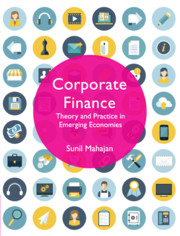Book contents
- Frontmatter
- Contents
- List of Figures
- List of Tables
- List of Corporate Snippets
- List of Abbreviations
- Preface
- Acknowledgements
- 1 Corporate Finance: A Conceptual Introduction
- 2 Financial Markets
- 3 The Time Value of Money
- 4 Capital Budgeting
- 5 Risk and Return
- 6 Valuation
- 7 Capital Structure and Financing
- 8 Dividend Payout: Policy and Practices
- 9 Leverage
- 10 Financial Derivatives
- 11 International Finance
- 12 Working Capital
- 13 Ratio Analysis
- Appendix
- Bibliography
- Index
11 - International Finance
Published online by Cambridge University Press: 30 April 2020
- Frontmatter
- Contents
- List of Figures
- List of Tables
- List of Corporate Snippets
- List of Abbreviations
- Preface
- Acknowledgements
- 1 Corporate Finance: A Conceptual Introduction
- 2 Financial Markets
- 3 The Time Value of Money
- 4 Capital Budgeting
- 5 Risk and Return
- 6 Valuation
- 7 Capital Structure and Financing
- 8 Dividend Payout: Policy and Practices
- 9 Leverage
- 10 Financial Derivatives
- 11 International Finance
- 12 Working Capital
- 13 Ratio Analysis
- Appendix
- Bibliography
- Index
Summary
The benefits from a world currency would be enormous.
—Robert MundellLaker Airways enjoyed a lucrative business in the 1970s, carrying tourists from the United Kingdom (UK) to the United States of America (USA). The business was highly successful, and the company purchased additional aircraft to cater to the rising demand. It financed the aircrafts by borrowing in US dollars, thus creating a mismatch. While its earnings were primarily in GB pounds, it created liabilities in US dollars. In 1981, the US dollar strengthened and continued to remain strong for a few years. A high dollar (low value of GB pounds) increased the cost for British travellers and reduced the demand, and revenues, for Laker Airways. At the same time, the interest and repayment of loans, being in US dollars, became more burdensome. Eventually, the company became bankrupt.
The foreign exchange market is the market for trading currencies of different countries. Each country has its own currency which can be used to purchase goods and services in that country. Indians earn in Indian rupees and spend in it. The citizens of Thailand earn in Thai baht and spend in the Thai baht. The currency of a country is acceptable within its boundaries but usually not outside it. However, there are currencies such as the US dollar, the GB pound, the euro and the yen, which are widely accepted by traders around the world. All the same, transborder trade and investment requires converting the currency of one country to that of another.
The Indian rupee is not a widely accepted currency outside India. When we travel abroad, we stock up on US dollars, GB pounds or euros to be able to pay for goods and services we buy locally in the country we visit. Similarly, when corporates make acquisitions abroad, they must pay in the currency of the other country as Tata Sons Ltd did when it paid in GB pound for purchasing the iconic Tetley Group, UK (GB£271 million).
As a simple illustration, when Infosys Ltd undertakes a project for General Electric in the USA, it earns in US dollars for the project.
- Type
- Chapter
- Information
- Corporate FinanceTheory and Practice in Emerging Economies, pp. 264 - 282Publisher: Cambridge University PressPrint publication year: 2020

